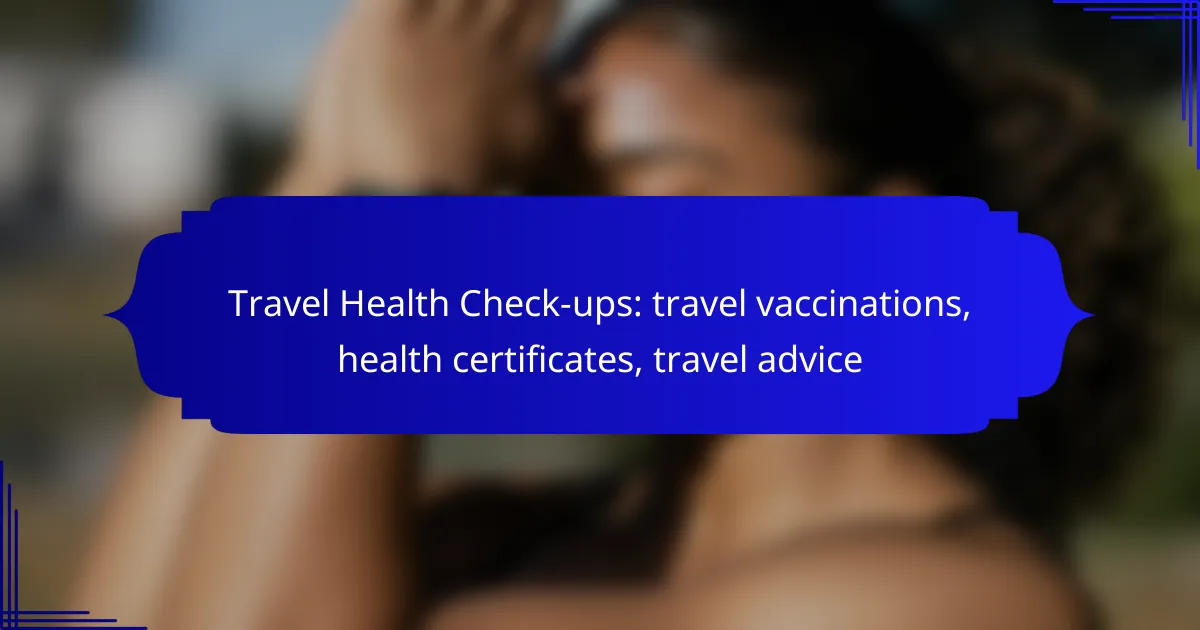Before embarking on your travels, it’s essential to prioritize your health by obtaining necessary vaccinations and health certificates. Vaccinations for diseases such as hepatitis A, hepatitis B, and typhoid are recommended to safeguard your well-being. Additionally, visiting an authorized healthcare provider can help you secure a travel health certificate, which may be required for certain destinations. Staying informed about health advice and practices will ensure a safer and more enjoyable journey.
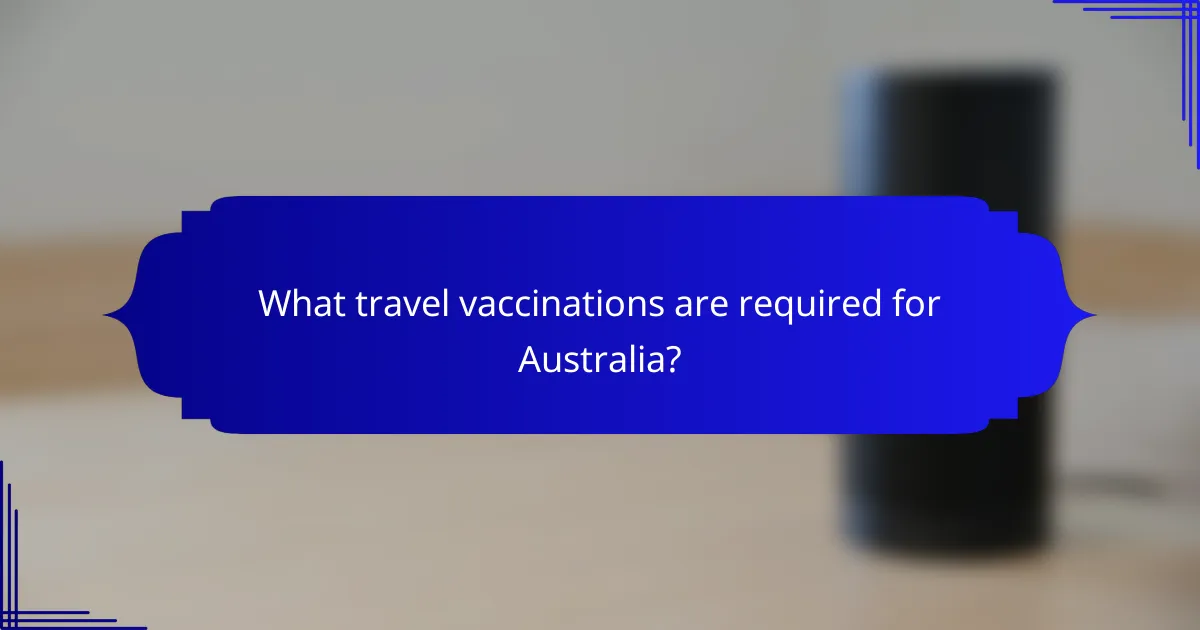
What travel vaccinations are required for Australia?
Travel vaccinations for Australia primarily include vaccines for diseases such as hepatitis A, hepatitis B, and typhoid. While not mandatory for entry, these vaccinations are strongly recommended to ensure traveler safety and health.
Common vaccinations for travelers
Common vaccinations for travelers to Australia include hepatitis A and B, typhoid, and influenza. These vaccines help protect against illnesses that can be contracted through food, water, or close contact with infected individuals.
Additionally, travelers should consider vaccines for tetanus and diphtheria, especially if they plan to engage in outdoor activities. It’s advisable to check your vaccination history and consult with a healthcare provider to ensure you are up to date.
Recommended vaccines by destination
The recommended vaccines can vary based on specific regions within Australia and the activities planned. For instance, if visiting remote areas, vaccines for rabies may be advised, particularly for those who might come into contact with wildlife.
Travelers should also consider the latest health advisories from the Australian government or health organizations, as recommendations can change based on emerging health risks. Always consult a travel health clinic for personalized advice based on your itinerary.
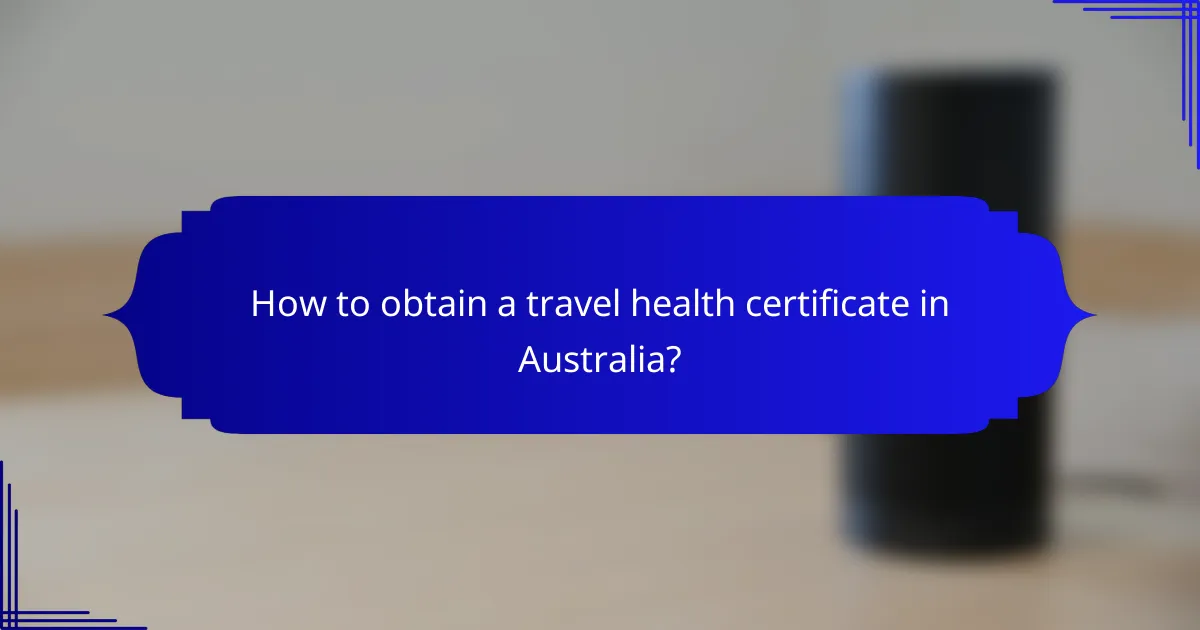
How to obtain a travel health certificate in Australia?
To obtain a travel health certificate in Australia, you need to visit an authorized healthcare provider who can assess your health status and provide the necessary documentation. This certificate may be required for international travel, especially for certain vaccinations or health regulations specific to your destination.
Steps to acquire a health certificate
First, schedule an appointment with an authorized clinic or healthcare provider. During your visit, you will undergo a health assessment, which may include a review of your vaccination history and any required vaccinations. After the assessment, the provider will issue a health certificate if you meet the necessary health criteria.
Be sure to bring any relevant medical records, including vaccination documentation, to expedite the process. It’s advisable to start this process several weeks before your travel date to ensure you have ample time to receive any required vaccinations.
Authorized clinics for health certificates
In Australia, travel health certificates can be obtained from various authorized clinics, including travel medicine clinics, general practitioners, and specialized vaccination centers. Look for clinics that are recognized by the Australian government or have accreditation from relevant health authorities.
To find an authorized clinic near you, consider using online resources or contacting local health departments for recommendations. Ensure that the clinic you choose has experience in travel health services to receive accurate advice and documentation.

What travel health advice should I follow?
Travel health advice includes staying informed about necessary vaccinations, obtaining health certificates, and following general wellness practices while traveling. Prioritizing your health before and during your trip can help prevent illness and ensure a safe experience.
General health tips for travelers
Before traveling, ensure you are up-to-date on routine vaccinations and consider additional immunizations based on your destination. Carry a basic first-aid kit and any personal medications, and keep them in their original packaging to avoid issues at customs.
Stay hydrated, especially in hot climates, and be cautious with food and water to avoid gastrointestinal issues. It’s advisable to wash your hands frequently and use hand sanitizer when soap isn’t available.
Specific advice for high-risk destinations
For high-risk destinations, consult a travel health clinic at least 4-6 weeks prior to departure to receive recommended vaccinations, such as those for yellow fever or typhoid. Some countries may require proof of vaccination for entry, so be prepared with health certificates.
Be aware of local health risks, such as malaria in certain regions, and take preventive measures like using insect repellent and sleeping under mosquito nets. Research local healthcare facilities in case of emergencies, and consider travel insurance that covers health issues abroad.
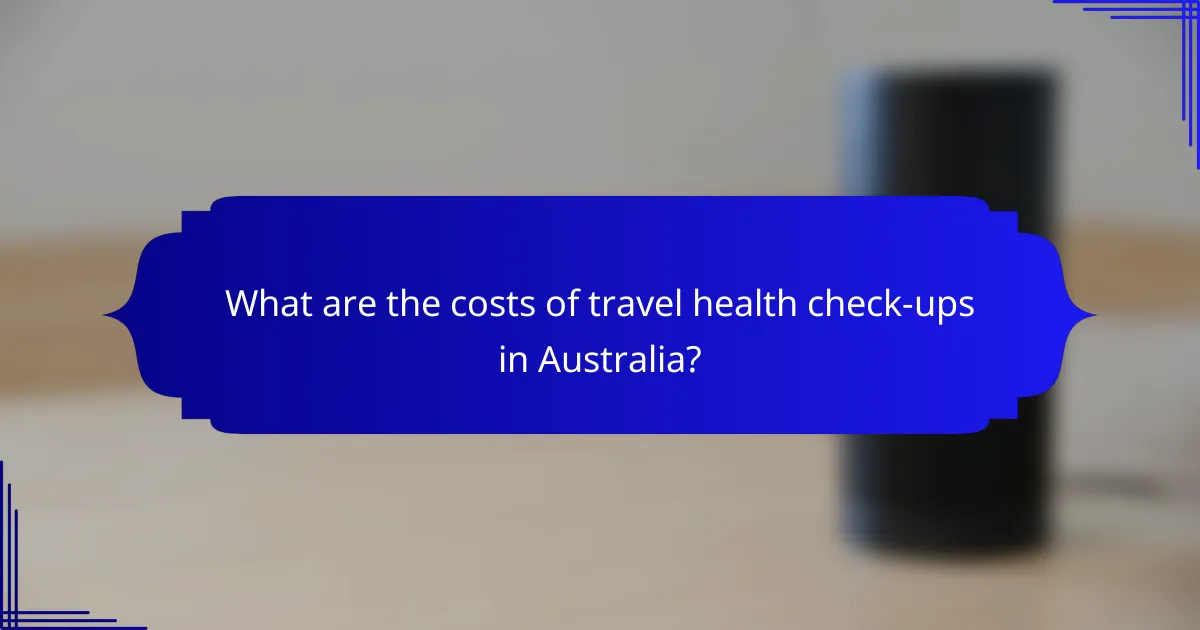
What are the costs of travel health check-ups in Australia?
The costs of travel health check-ups in Australia can vary widely based on the type of vaccinations needed, the health certificates required, and the specific clinic or provider. Generally, individuals should budget for both vaccinations and any associated health documentation when planning their travel health needs.
Average pricing for vaccinations
Vaccination costs in Australia typically range from AUD 30 to AUD 200 per shot, depending on the vaccine type. Common vaccines for travel include those for hepatitis A, typhoid, and yellow fever, with some requiring multiple doses.
It’s advisable to check with local health clinics or travel health specialists for specific pricing and availability. Some clinics may offer package deals for multiple vaccinations, which can help reduce overall costs.
Health certificate fees
Health certificate fees in Australia usually fall between AUD 50 and AUD 150, depending on the issuing authority and the complexity of the required documentation. These certificates may be necessary for certain destinations or specific activities, such as volunteering or working abroad.
When obtaining a health certificate, ensure that it meets the destination country’s requirements to avoid complications during travel. It’s wise to allow sufficient time for processing, as some certificates may require additional testing or verification.
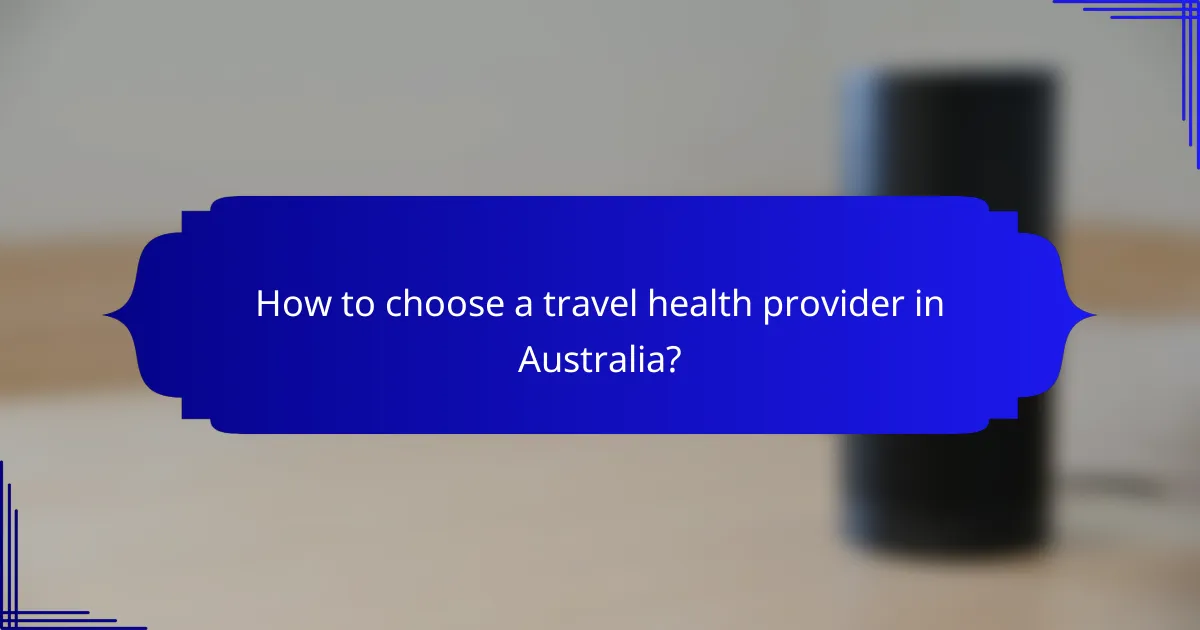
How to choose a travel health provider in Australia?
Choosing a travel health provider in Australia involves evaluating their expertise, services, and convenience. Look for clinics that offer comprehensive travel vaccinations, health certificates, and tailored travel advice to ensure a safe journey.
Criteria for selecting a provider
When selecting a travel health provider, consider their qualifications, experience, and range of services. Ensure the clinic is accredited and staffed by qualified health professionals with experience in travel medicine.
Check for the availability of necessary vaccinations and health certificates relevant to your travel destinations. A good provider should also offer personalized travel advice based on your health history and itinerary.
Location and accessibility are important factors as well. Choose a clinic that is conveniently located and offers flexible appointment times to accommodate your schedule.
Top-rated travel health clinics
In Australia, several travel health clinics are recognized for their quality services. Some of the top-rated options include Travelvax, Passport Health, and the Travel Medicine Clinic.
These clinics typically offer a wide range of vaccinations, health assessments, and travel advice tailored to specific destinations. They often have knowledgeable staff who can provide up-to-date information on health risks and requirements for various countries.
Before making a choice, read reviews and check ratings to ensure you select a clinic that meets your needs effectively. Consider contacting them directly to inquire about their services and any specific concerns you may have.

What are the risks of not getting travel vaccinations?
Not getting travel vaccinations can expose you to serious health risks, including contracting diseases that are preventable through vaccination. These diseases can lead to severe illness, long-term health complications, or even death, particularly in areas where such illnesses are endemic.
Health risks associated with travel
Traveling to different regions often means encountering unfamiliar pathogens. Without vaccinations, travelers may be at risk for diseases like yellow fever, typhoid, or hepatitis A, which are prevalent in certain countries. These illnesses can result in hospitalization and significant medical expenses.
Additionally, some diseases can spread rapidly in crowded areas, such as airports or public transport. This increases the likelihood of exposure, making vaccinations a critical preventive measure for maintaining health while traveling.
Consequences of vaccine-preventable diseases
Vaccine-preventable diseases can lead to severe health consequences, including complications that may require extensive medical treatment. For example, measles can cause pneumonia and encephalitis, while polio can lead to paralysis. These outcomes not only affect the individual but can also strain local healthcare systems.
Moreover, contracting a vaccine-preventable disease while abroad can disrupt travel plans, leading to unexpected costs and delays. Travelers may need to extend their stay for treatment or quarantine, which can be both financially and emotionally taxing.

What emerging trends are shaping travel health check-ups?
Emerging trends in travel health check-ups focus on personalized healthcare, digital health solutions, and increased awareness of global health risks. These trends are reshaping how travelers prepare for international trips, ensuring they receive tailored advice and necessary vaccinations based on their destinations.
Personalized travel health assessments
Personalized travel health assessments are becoming more common, allowing travelers to receive tailored recommendations based on their medical history and travel itinerary. Health professionals analyze individual health risks and suggest specific vaccinations and preventive measures. This approach enhances safety and ensures that travelers are well-prepared for potential health challenges.
Travelers should consider scheduling these assessments at least a month before their trip to allow time for vaccinations and any necessary follow-up appointments. This proactive approach can significantly reduce health risks while abroad.
Digital health solutions
Digital health solutions, such as mobile apps and telemedicine, are revolutionizing travel health check-ups. These tools enable travelers to access health information, vaccination records, and medical advice from anywhere. Many apps offer reminders for vaccinations and health check-ups, making it easier to stay on track.
For instance, some platforms allow users to consult with healthcare professionals remotely, which is particularly useful for last-minute travelers. However, it’s crucial to ensure that any digital solution complies with local regulations and maintains data privacy.
Increased awareness of global health risks
There is a growing awareness of global health risks, such as infectious diseases and environmental hazards, which influences travel health check-ups. Travelers are now more informed about potential outbreaks and health advisories, prompting them to seek vaccinations and health certificates before traveling.
Staying updated on health advisories from organizations like the World Health Organization (WHO) or the Centers for Disease Control and Prevention (CDC) can help travelers make informed decisions. Additionally, travelers should check if their destination requires specific health certificates, as these regulations can vary widely by country.
